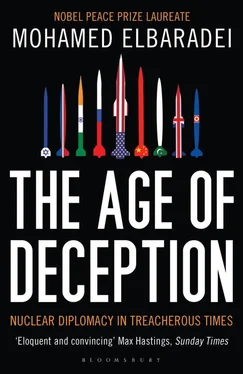When in the weeks leading up to the war I pressed Blix to join me in asking the Security Council for more time, he declined. He said this might be interpreted to imply that he would be able to achieve results by a particular date, and he was not sure if UNMOVIC could follow through. “But,” he said, “if they ask me whether we need more time, I will say yes.”
On March 16, four days before the war began, President Bush and Prime Minister Blair met with the Spanish prime minister, José María Aznar, on the Azores Islands. They were hosted by the prime minister of Portugal, José Manuel Barroso. From what I learned of this meeting, the British benchmark proposal received only marginal attention. The talks centered on a different topic: whether the so-called moment of truth had arrived. Blair and Aznar made clear they still wanted to give diplomacy a chance. Bush was unwilling to wait: the course of action that would determine Iraq’s fate, he insisted, would be decided that day.
Indeed, that morning in the United States, Dick Cheney gave an interview on Meet the Press. The host, Tim Russert, asked him what he thought about the IAEA’s conclusion that Iraq had not resumed its nuclear weapons program. “We believe [Saddam Hussein] has, in fact, reconstituted nuclear weapons,” Cheney said. “I think Mr. ElBaradei, frankly, is wrong.”
I thought back to Cheney’s warning, given before the start of the inspections, that he would willingly discredit their outcome. Now, on the brink of war, he was attempting to do exactly that. “If you look at the track record of the International Atomic Energy Agency and this kind of issue, especially where Iraq is concerned,” Cheney told Russert, “they have consistently underestimated or missed what it was Saddam Hussein was doing. I don’t have any reason to believe they’re any more valid this time than they’ve been in the past.”
Of course I cannot divine—nor could I then—what Cheney knew or believed about Iraq’s WMD programs. But he knew exactly why the IAEA’s conclusions about Iraq in 2003 should be granted a much higher degree of validity than those of 1991. He knew as well as anyone that in the 1990s we had been authorized to verify only what Hussein’s government reported to us. We had no authority to travel elsewhere in the country, nor to look for clandestine nuclear facilities, nor to ferret out illicit nuclear material transactions.
He was also acutely aware that times had changed. The IAEA had since spent years in Iraq with sweeping “anytime, anywhere” authority. We had crisscrossed the country. We had interviewed every nuclear scientist available. We had destroyed equipment, confiscated records, put the remaining nuclear material under IAEA seal, and blown up the nuclear production facilities at Al Atheer. To liken 2003 to 1991 was an act of deliberate distortion. The die, it seemed, had been cast.
The phone call came very late that night, at around one o’clock in the morning Vienna time, on Monday, March 17. It was Ken Brill, the U.S. ambassador to the IAEA, calling to say that his government was advising us to move out of Baghdad. As Brill transmitted the message, the intent from Washington was to give us advance notice so that we could protect our people on the ground.
I immediately phoned Hans Blix, who had received a similar call, and Kofi Annan. He had clearly wanted to avoid a war and find a diplomatic solution. Annan had struggled to maintain the legitimacy of the United Nations and to keep the Security Council from being manipulated in the interests of a few countries. In a speech given a month earlier, at William and Mary College, he declared, “This is an issue not for any one state alone, but for the international community as a whole.” Later, he added, “When states decide to use force, not in self-defense, but to deal with broader threats to international peace and security, there is no substitute for the unique legitimacy provided by the Security Council.”
Kofi Annan had been heavily criticized for a stance he had taken in 1998, after successfully pressing for Saddam Hussein to allow access to eight sites—presidential palaces—that were previously off limits. At the time, he had said, “Can I trust Saddam Hussein? I think I can do business with him…. I’m not, I think, perhaps not as pessimistic as some of you are.” In response, some had ridiculed the secretary-general as naïve.
Now, at this critical hour, I found myself wishing that the soft-spoken Annan had raised the pitch on Iraq, particularly in the face of accusations made by Bush back in November that the United Nations had no spine and that it would become irrelevant. I had been quite impressed by Annan’s determined efforts to engage civil society to explain the role of the United Nations, pressing for global action to address poverty and HIV/AIDS. Although Annan had no mandate in the inspection process, he would have reflected the views of the overwhelming majority of the public, globally, had he been more vocal in defense of the principles of world order spelled out in the UN Charter. But at the time, he was focused on resolving the question of divided Cyprus.
In the desperate early hours of Monday, March 17, as we spoke on the phone, Annan wanted to delay making a decision on pulling UN personnel out of Iraq until the following morning, New York time, to discuss the matter with the president of the Security Council and to talk to Secretary Powell. I also called the president of the Security Council to inform him about the message we had received. He, too, decided to discuss the issue with his colleagues in the morning. Blix wanted to pull out of Baghdad immediately because of safety concerns for the UN staff. I was of the view that we should wait—that we should not leave simply because the United States had told us to do so.
I hung up the phone. Sleep would be a long time coming. Well into the dawn, I spoke with my wife, Aida, my favorite source of good counsel. Together we speculated on how this was going to unfold. How long would the war last? What would be the extent of casualties? There was nothing more I could do. My feelings vacillated from anger to a sense of helplessness to grief for the coming loss of life. Where was the justification?
It is true that, throughout the inspections, I believed the Iraqis could have acted faster and shown more transparency. I was never completely certain as to why they did not. In part, I believe they wanted to preserve their dignity: respect is the most valuable currency in Middle Eastern negotiations, and it would have been unacceptable for the Iraqis to appear intimidated or humiliated by the inspections. It may have been the persistent suspicion that the UN inspections were an instrument for intelligence gathering, in preparation for war. Or perhaps they simply believed that because there were no WMDs to be discovered, the truth would eventually prevail.
The Iraqis also understood that the United States did not intend to let Saddam Hussein off the hook. In this context, perhaps transparency and full support for the inspections might not have seemed like the pathway to a solution. And of course many believed that the war was inevitable, that there was no light at the end of the tunnel.
Hans Blix, Kofi Annan, and I reconvened by conference call later that Monday morning. We were numb, yielding to a course of action in which none of us believed. Annan had decided to recommend to the Security Council that, out of concerns for safety, we suspend all UN operations in Iraq. The council’s response was to “take note” of the decision. Some members, such as the Russians and the Syrians, were not pleased; but of course the council as a whole understood the futility of jeopardizing the safety of UN personnel in order to protest the action of the coalition. Given that the IAEA depended on UNMOVIC for logistics, we had no choice but to join the action. I issued the order for our inspectors to come home.
Читать дальше












